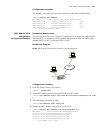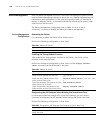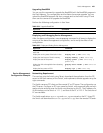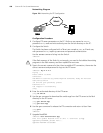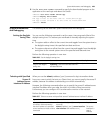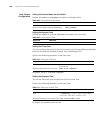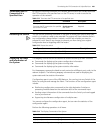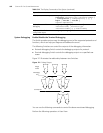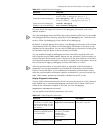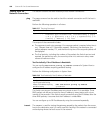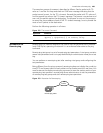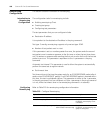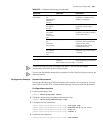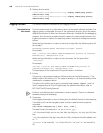
Displaying the State and Information of the System 463
Table 515 Enable/Disable the Debugging
For more about the usage and format of the debugging commands, refer to the
relevant chapters.
Since the debugging output will affect the system operating efficiency, do not enable
the debugging without necessity, especially use the
debugging all command with
caution. When the debugging is over, disable all the debugging.
By default, if multiple devices form a fabric, the debugging information of the master
is broadcasted within the fabric and the debugging information of the slave is only
displayed on the slave device. You can view the debugging information including that
of the master and the device in which the login port resides.
You can enable the logging, debugging and trap information switches within the
fabric by executing the
info-center switch-on all command. Synchronization is a
process that each switch sends its own information to the other switches in the fabric,
and meantime receives information from others to update local information, ensuring
the consistency of logging, debugging and trap information in a fabric.
After the synchronization of the whole fabric, a great deal of terminal display is
generated. You are recommended not to enable the information synchronization
switch of the whole fabric. If you enabled the information synchronization switch,
after the synchronization information statistics and detection, you must execute the
undo info-center switch-on command to disable the switch in time.
Display Diagnostic Information
You can collect information about the Switch to locate the source of a fault. However,
each module has its corresponding display command, which makes it difficult to
collate all the information needed. In this case, you can use
display
diagnostic-information
command.
You can perform the following operations in all views.
Table 516 Display Diagnostic Information
Operation Command
Enable the protocol debugging debugging { all [ timeout interval ] |
module-name [ debugging-option ] }
Disable the protocol debugging undo debugging { all | { protocol-name |
function-name } [ debugging-option ] }
Enable the terminal debugging terminal debugging
Disable the terminal debugging undo terminal debugging
Operation Command Description
Display the system diagnostic
information, or save the system
diagnostic information to a file
(with a suffix of "diag") in the
flash memory.
display
diagnostic-information
You can execute these display
commands in any view
Display the debugging switches
opened on a specified switch or
in the whole fabric
display debugging { fabric |
unit unit-id } [ interface
interface-type
interface-number |
module-name ]
Display the debugging switches
opened in the fabric by module
names
display debugging fabric
by-module



